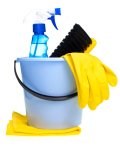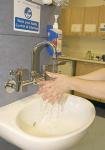There is so much to learn and “digest” in the world of bacteria, one particular, Clostridium difficile (aka: C. diff). In today’s news a Texas A&M Biologist, Joseph Sorg, an assistant professor in the Department of Biology since 2010, is among a wave of younger researchers studying C. difficile (aka C. diff).
An excerpt from the article referenced:
“What we’re interested in doing is trying to develop an inhibitor as a potential drug,” Sorg said. “If you inhibit the process of germination, you would completely inhibit the disease.”
Sorg and his research group will be working on the recent two-year, $275,000 National Institutes of Health grant with Sonenshein and Yoav Golan, a clinician at Tufts Medical Center in Boston. The goal of the trio’s research is to understand the bile acid composition of various human populations — healthy people, those who have C. difficile, and those who have recurring C. difficile infection — in order to develop drugs with the potential to inhibit C. difficile infection. The human fecal samples will be collected at Tufts Medical Center and shipped to Texas A&M, where Sorg will use his $80,000 portion of the grant funding to analyze the bile acid composition of the blind samples.
“The microbial flora in a healthy person metabolizes bile acids into secondary bile acids, and these secondary bile acids are actually toxic to C. diff growth,” Sorg said. “One of the ways we think that microbial flora inhibits C. diff infection is this metabolism. And when you go on antibiotics, the microbial flora that does this metabolism is obliterated. This NIH grant will allow us to correlate a particular bile acid profile with susceptibility to C. diff infection.”
New medications in Phase III, new studies, additional scientific data being collected are all positive steps forward.
However; constant reminders and maintaining the primary prevention accomplished through hand washing (hand hygiene) guidelines, and protocols, reducing antibiotic use when treating viruses vs bacterial infections, and utilizing room disinfectants, and EPA Registered c. diff sporicide products will prove positive reductions in new cases of C. diff. and other major hospital associated infections worldwide.
To read more about Joseph Sorg and his research group please click on the following link: http://www.eurekalert.org/pub_releases/2013-08/tau-tab082913.php
“C Diff Foundation: Educating, and advocating for C. diff. prevention, treatments, and environmental safety worldwide.”





